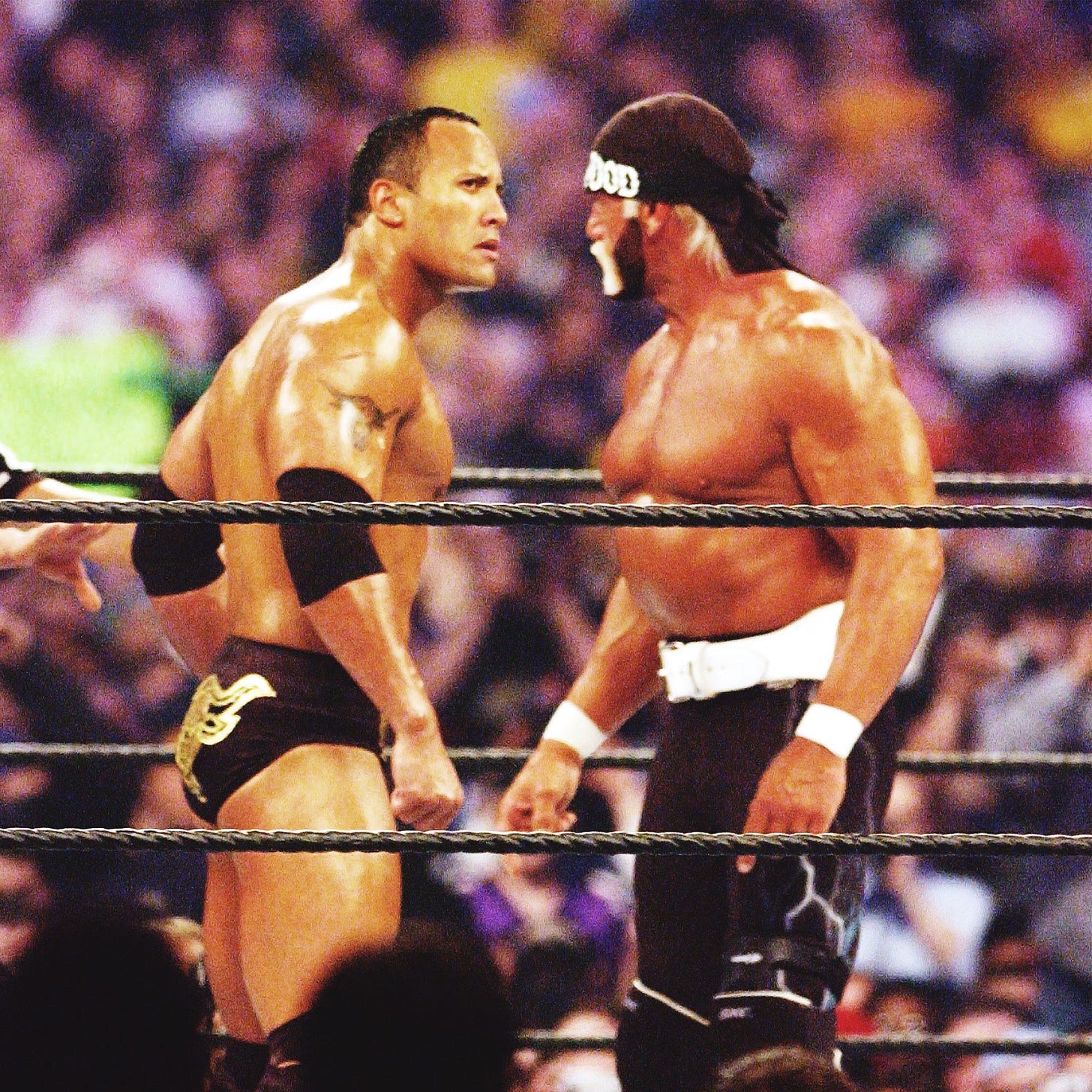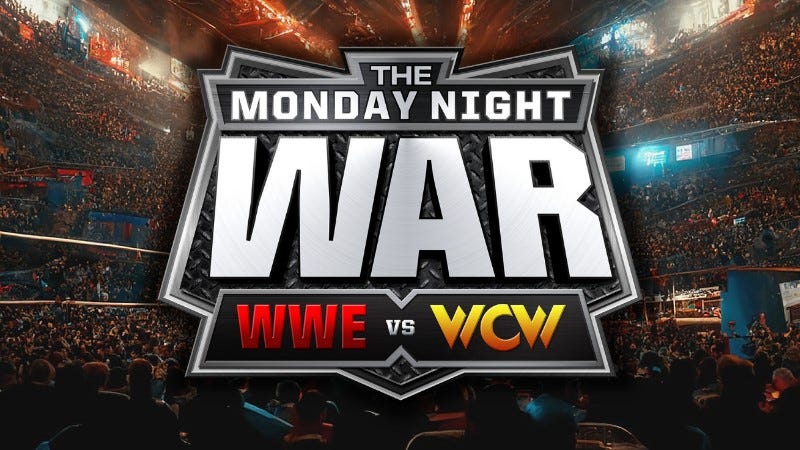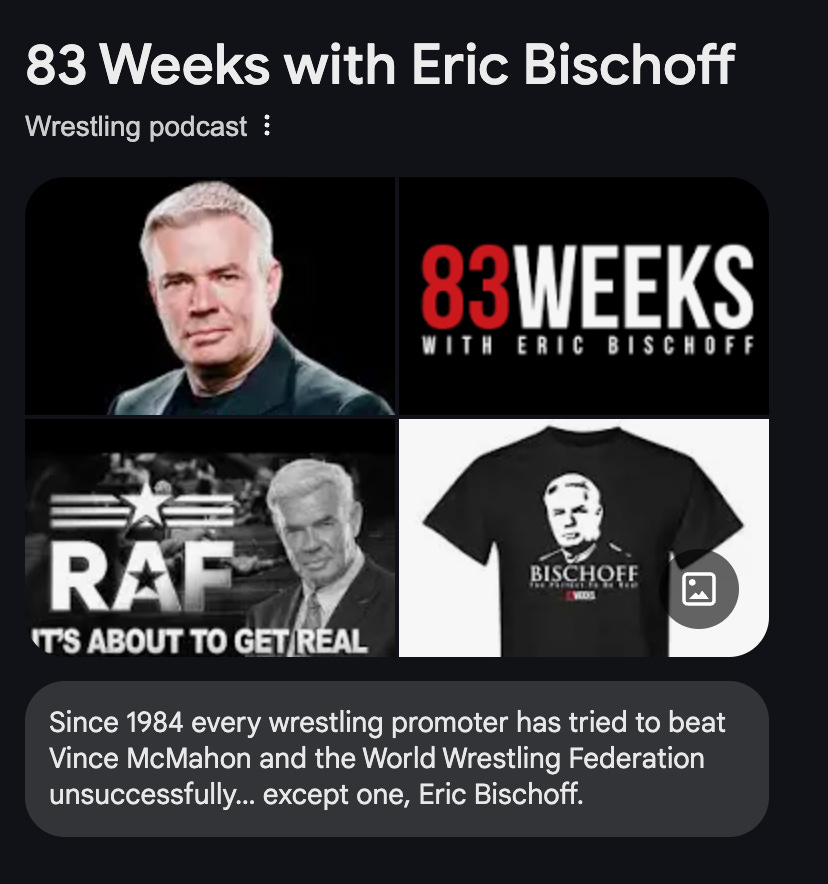I wrote about WWE for business case study when I was in college. Everyone else chose Apple. They picked Google. I went with wrestling.
I've loved it since childhood. Hulk Hogan flexing. The Undertaker's deadman stare. Fake blood. Faker fighting. Pure theater that hooked me for life.
I find that competition in wrestling business (WWE - World Wrestling Entertainment vs WCW - World Championship Wrestling) bears a great lesson for startups. A lesson of product market fit.
So who is this for?
If you are a founder spending time looking into the features of your competition or other startups that raised funding and seemingly getting traction while you can’t make a proper dime, stop pulling your hair out - and read on.
The Monday Night Wars
People underestimate WWE. They see spandex and stunts. They miss the business brilliance that built an entertainment empire.
One story stands above the rest for me: The rivalry between WWE and WCW.
Ted Turner (founder of CNN, billionaire) owned WCW. He had billions and bankrolled losses. He wanted to win.
This is the time around when McMahon of WWE (you might know him as Mr. McMahon, the villain) was dominating the whole market along with the highest ratings in the global wrestling entertainment industry.
Then came 1995.
Under Eric Bischoff's leadership as the executive producer of WCW, everything changed. WCW didn't just survive. It thrived. It beat WWF in ratings for 83 consecutive weeks. It nearly bankrupted McMahon's family business. And it triggered wrestling's greatest transformation ever.
How? Not by being better. By being different.
The false appeal of being better
WCW tried to beat WWE for years. They recruited their talent. They spent more in advertising. And anything a billionaire could fund.
So when everything fell flat, Bischoff (the executive producer of WCW) tried something new.
A very simple idea - taken extremely serious.
How can we be different?
Bischoff took out a sheet of paper. Drew a vertical line in the middle.
On the left: WWE. On the right: WCW.
McMahon taped their shows.
Bischoff would go live.
McMahon targeted the preteen audience aged 12 to 18.
Bischoff would target the young adults aged 18 to 34.
McMahon created cartoonish characters.
Bischoff would build reality-based dirty storylines.
Here's Bischoff himself:
After realizing that I can't be better than them at what they do, what are my options? I started making a list of every way that I could be different than WWE. Top of the list: They are taped. Okay, I am live. They are cartoonish, because they are appealing to a teen and preteen audience. I am gonna be more real. I wanted my characters to appeal to an older audience. I wanted my stories to be more reality-based.
Then came the kill shot. WCW would announce WWF match results at the start of their show. They'd spoil pre-taped matches before they aired. Pure psychological warfare. And it worked.
How?
They beat McMahon’s company in ratings for 83 weeks straight.
Here is the way to put 83 weeks in perspective:
Live sports win their night almost every week during the season, but their calendars reset.
ESPN’s Monday Night Football at 15 weeks — is still just a fraction of WCW Nitro’s 83.
Fun fact: the guy has a podcast called 83 weeks.
Which brings me back to product market fit.
Most founders (including myself) try to be better.
We copy - thinking the features are table stakes.
We play startup instead of doing one.
By nature of it, a startup is a fuck-you company. Not a love-you company. That is better done by non-profits.
So what should you do instead?
Be different.
Depending on the level of your ambition, you need three things:
A growing market. This gives you room.
A different solution to an existing problem. This gives you identity. The simpler it is the better.
A solution people actually prefer. This gives you customers.
The hard part isn't being different. Anyone can be weird. The challenge is being different in a way that works better for users than what already exists.
WCW found that sweet spot. Wrestling fans wanted entertainment. WWF provided it one way. WCW delivered it differently. And for 83 weeks, different won.
Some more examples
I know this is uncomfortable, inconvenient and to be honest, irritating.
After all, you already built a bunch of features. You might be getting some traction, not quite enough but not bad either.
I know because I did the same with Godmode.
So here are some of your favourite companies. However, this time around, we will look at them from a different lens.
Uber
What is Uber? A taxi service. Nothing more. Nothing less. It solves the same problem as yellow cabs that roamed streets for centuries.
The problem: on demand transportation and quick rides.
But no one says, "I'm taking a black taxi." They say, "I'm taking an Uber."
Different won.
Perplexity
They could have built a better search algorithm. They could have tweaked PageRank. They could have optimised results better than Google did.
The problem: internet search.
Instead, they changed the interface. They turned search into conversation. They made it feel human.
Early to say: different won. However it is definitely going well from the likes of it.
Cursor
While Cursor fixed bugs, GitHub Copilot conquered the world. Microsoft won. Game over. This was the narrative only 2 years ago, told by most VCs.
The problem: Organising and writing code.
Then Claude 3.5 appeared and changed everything. Suddenly one-shot app generation became possible. Cursor pivoted fast. The messaging was not "code better" but "create apps from scratch with words."
Copilot was a developer's assistant. Cursor became an app generator. The product? It is the same product, same features.
Heygen
Adobe After Effects gives you tools to edit video. Complex. Powerful. Professional.
The problem: Producing good videos.
Heygen generates videos for you. Simple. Accessible. Magical.
Do they have same features now that Adobe has AI? Maybe. Different perception? Absolutely.
Different won.
Exceptions
You can try to be better. Some succeed. Linear is trying to beat Jira this way. Are they ever going to be as big as Atlassian? Not really sure.
But consider the odds:
Your competition has more engineers
Your competition has more feedback
Your competition has more resources
Your competition has more time
Building a company is hard enough. Why choose the hardest path?
In short:
The point is this:
There is a big chance that the problem you are solving is out there and already being addressed by other companies, big and small.
Don’t reinvent a problem. Take it but solve it in a different way.
In the next post, I will put this perspective in a matrix with more examples. It is structured of two axis.
Different vs better
Niche vs horizontal markets
Subscribe if you wanna read that.
As always, feedback is welcome. If you got pissed off reading this, I did my job well. Just let me know how pissed off.
Mert








I find myself leaning more and more into this mindset lately. We definitely need to think way more unorthodox.